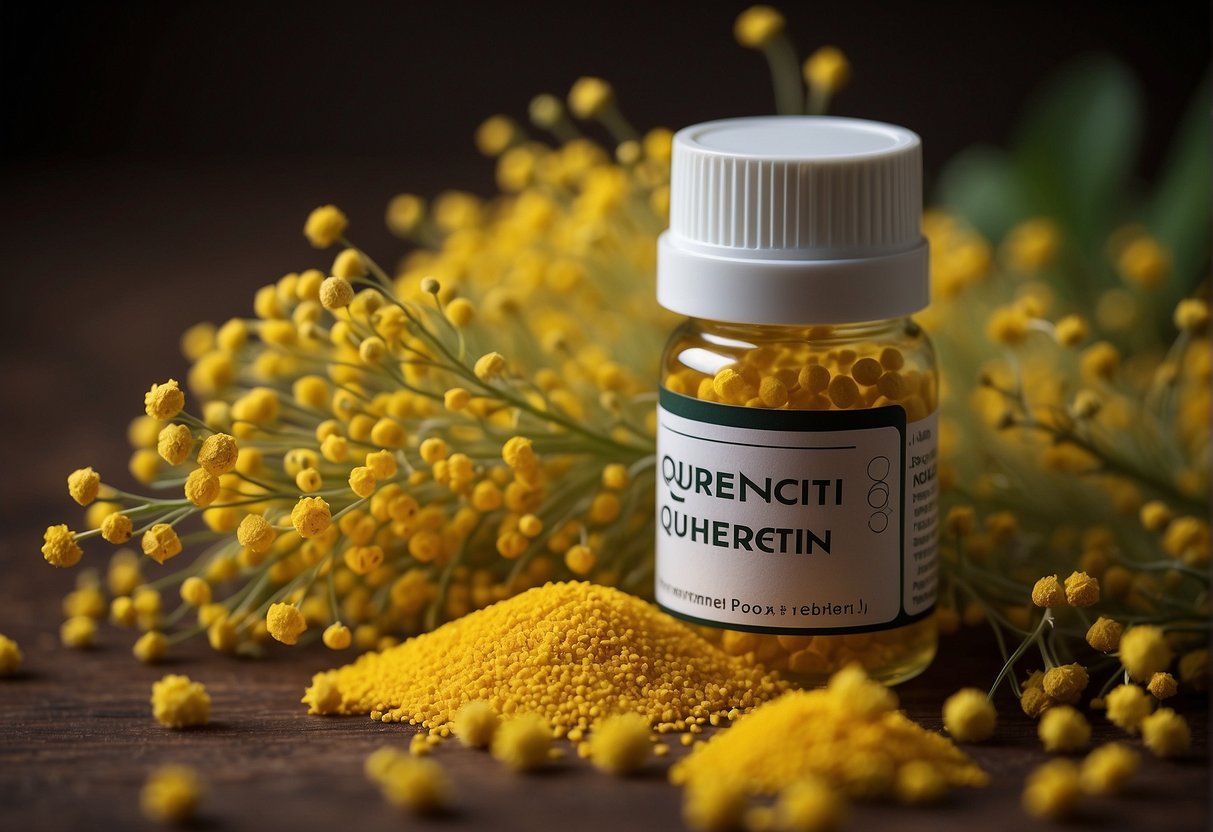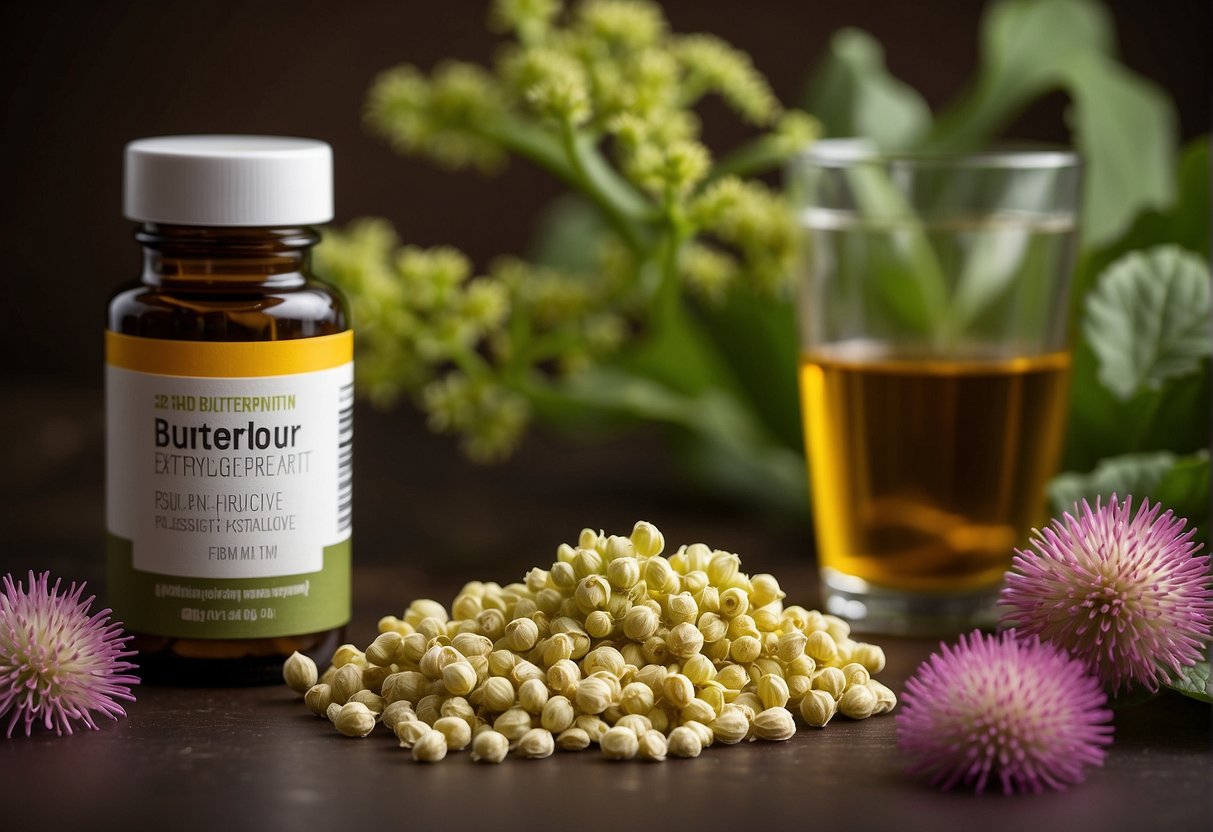Millions of people worldwide grapple with allergies, which can lead to symptoms ranging from mild discomfort to severe reactions. With an abundance of over-the-counter medications, there’s also a growing interest in the use of dietary supplements to ease allergy symptoms. These supplements may offer a more natural approach to managing the immune system’s response to allergens.
Research suggests that certain vitamins, minerals, and herb-derived compounds can support the body’s defenses and reduce the severity of allergic reactions. Physicians and nutrition experts often discuss the potential benefits of vitamin C, omega-3 fatty acids, and probiotics, among others, in the context of allergy symptom management.
Key Takeaways
- Certain supplements may help manage allergy symptoms by supporting the immune system.
- Using natural compounds like quercetin and bromelain could offer antihistamine and anti-inflammatory benefits.
- Supplements should be considered as part of a broader allergy management strategy.
Understanding Allergies
Allergies occur when a person’s immune system reacts to substances called allergens that are generally harmless to most people. These allergens can be found in pollen, pet dander, dust mites, and certain foods.
Types of Allergens:
- Pollen: Often associated with seasonal allergies, also known as hay fever.
- Pet dander: Small, sometimes microscopic, flecks of skin shed by cats, dogs, rodents, birds, and other animals with fur or feathers.
- Dust mites: Microscopic organisms that thrive in warm, humid environments and are common in household dust.
- Foods: Common allergenic foods include nuts, milk, eggs, and shellfish.
When a person with allergies comes into contact with an allergen, their immune system mistakenly identifies it as a threat and releases chemicals like histamines, leading to symptoms such as:
- Nasal symptoms: Sneezing, runny nose, nasal congestion, and itchy nose.
- Eye symptoms: Itchy, red, or watery eyes.
- Skin symptoms: Hives, itchiness, or eczema.
Severity of symptoms can vary from mild irritation to severe allergic reactions such as anaphylaxis, a potentially life-threatening emergency that requires immediate medical attention.
People with allergies may manage their symptoms through various strategies, including avoidance of known allergens, the use of over-the-counter or prescription medications, and immunotherapy. The appropriate approach depends on the type and severity of the allergic reaction.
Role of Supplements in Allergy Management
Supplements can be an adjunct in managing the symptoms of allergies, though they should not replace traditional treatments recommended by healthcare professionals. When incorporated properly, some supplements have been shown to offer relief from allergic reactions.
- Vitamin C: Recognized for its immune-boosting properties, vitamin C may act as a natural antihistamine. Studies suggest that a higher intake of vitamin C can alleviate symptoms such as a runny nose and watery eyes.
- Quercetin: This bioflavonoid stabilizes the release of histamines and helps control allergy symptoms. Quercetin is found in foods like onions and apples, but can also be taken in supplement form.
- Omega-3 Fatty Acids: Found in fish oil and flaxseed supplements, omega-3s have anti-inflammatory properties which may help reduce allergic responses.
- Probiotics: Beneficial bacteria in probiotics are thought to promote a healthier gut environment, which may influence the immune system and allergy responses favorably.
| Supplement | Potential Benefit |
|---|---|
| Vitamin C | Acts as a natural antihistamine. |
| Quercetin | Stabilizes histamine release and may ease allergy symptoms. |
| Omega-3 Fatty Acids | Have anti-inflammatory effects. |
| Probiotics | May improve immune system function. |
Individuals should consult with a healthcare provider before starting any new supplement regimen, especially those with pre-existing health conditions or those taking other medications. While supplements may help reduce symptoms, it’s important to combine them with other allergy management strategies for comprehensive care.
Vitamin C: Immune Booster
Vitamin C is a potent antioxidant that supports the immune system’s function. It plays a crucial role in combating allergies by reducing histamine levels.
Bioflavonoids Synergy
Bioflavonoids, naturally occurring compounds in fruits and vegetables, enhance the efficacy of Vitamin C. They work in harmony to strengthen the immune response and mitigate allergic reactions. Research suggests that quercetin, a type of bioflavonoid, is particularly effective when combined with Vitamin C in combating allergy symptoms.
Dosage Recommendations
- Adults: The standard dose ranges from 500mg to 1000mg daily.
- Children: A lower dose, typically around 250mg, can be administered, depending on age and body weight.
To maintain steady levels in the body, Vitamin C should be taken in divided doses throughout the day. It is always advisable to consult a healthcare provider before starting any supplementation regimen, especially for individuals with pre-existing health conditions or those on medication.
Probiotics: Gut Health and Immunity
Probiotic supplementation can influence gut health and immune function, potentially reducing allergic responses. They may help maintain a balanced gut flora which is critical for a robust immune system.
Strains for Allergy Relief
Certain probiotic strains have been identified as potentially beneficial for allergy relief. Lactobacillus rhamnosus GG and Bifidobacterium lactis are two such strains that studies indicate may mitigate allergic symptoms when ingested regularly. These strains can help by enhancing the body’s regulatory T cells, promoting an anti-inflammatory environment.
Timing and Dosage
The timing and dosage of probiotics can influence their effectiveness on allergy symptoms. A regular, consistent intake is typically recommended, as it allows the gut flora to remain stable. It’s essential to follow the manufacturer’s or healthcare provider’s recommended dosage, which generally ranges from 1 billion to 10 billion CFUs per day for maintaining immune health. Starting probiotics before allergy season may help in priming the immune response adequately.
Omega-3 Fatty Acids: Anti-inflammatory Effects
Omega-3 fatty acids are recognized for their anti-inflammatory properties, which may help reduce the symptoms associated with allergic responses.
Sources of Omega-3s
The primary sources of omega-3 fatty acids include:
- Fish: Especially cold-water fatty fish like salmon, mackerel, and sardines.
- Flaxseeds and flaxseed oil: These plant-based options are rich in ALA, a type of omega-3 fat.
- Nuts and seeds: Walnuts and chia seeds are good sources of omega-3s.
- Supplements: Fish oil capsules and algae-based supplements provide a direct source of EPA and DHA.
Dosage and Usage
The typical dosage for omega-3 supplements is as follows:
- Adults: The American Heart Association recommends 1 gram of EPA+DHA per day, preferably from oily fish.
- Supplement Users: For those who opt for fish oil supplements, following the manufacturer’s recommended dose is crucial, as concentrations can vary.
It’s important to consult with a healthcare provider before beginning any new supplement regimen, especially for individuals taking other medications or with existing health conditions.
Quercetin: Natural Antihistamine
Quercetin is a flavonoid that serves as a natural antihistamine and may help reduce allergy symptoms.
Benefits of Quercetin
Quercetin is known to have anti-inflammatory and antioxidant properties. It can stabilize mast cells and may prevent the release of histamine, which is responsible for the symptoms of allergic reactions. Studies suggest that taking quercetin supplements can lead to a reduction in sneezing, itching, and runny nose associated with allergies.
Optimal Consumption
For allergy relief, the recommended dose of quercetin varies, but it generally ranges from 400-500 milligrams taken twice daily. Quercetin is best absorbed when taken with a meal or in combination with fats or oils. Quercetin supplements are commonly combined with bromelain for enhanced absorption and anti-inflammatory effect.
Bromelain: Mucolytic Properties
Bromelain is an enzyme found in pineapple juice and the pineapple stem that possesses mucolytic properties, which means it helps break down mucus, potentially easing symptoms associated with allergies.
Combination with Quercetin
When bromelain is paired with quercetin, a flavonoid that naturally occurs in fruits and vegetables, it can enhance the absorption of quercetin. Research suggests that this combination can act synergistically, where bromelain’s mucolytic action complements quercetin’s anti-inflammatory and antihistamine effects, thus providing a more potent relief from allergy symptoms.
Stinging Nettle: Herbal Remedy
Stinging nettle has been utilized for centuries as a natural approach to alleviate allergy symptoms. Its natural antihistamine properties help manage the body’s response to allergens.
Preparation and Dosage
To harness the benefits of stinging nettle, it can be prepared in various forms. Common preparations include:
- Tea: Dried leaves steeped in hot water for 5-10 minutes.
- Capsules: Standardized extracts are available for more precise dosage.
- Tinctures: Liquid extracts can be diluted in water or taken directly.
When considering dosage, the following guidelines are typically advised:
- Tea: 1-2 cups daily during allergy season.
- Capsules: Often 300-500 mg of freeze-dried nettle leaf up to three times daily.
- Tinctures: 1-2 ml three times a day, but the concentration can vary by brand.
It is crucial to consult with a healthcare provider before starting any new supplement to ensure it’s appropriate for individual health needs and to prevent interactions with other medications.
Butterbur Extract: A Dual Inhibitor
Butterbur extract is recognized for its antihistamine and leukotriene inhibitor properties, making it a significant option for reducing allergy symptoms.
Efficacy
Butterbur extract has been the subject of various studies, indicating it can help alleviate nasal symptoms associated with seasonal allergies. Clinical trials have shown that butterbur — specifically an extract called Ze 339 — can be as effective as antihistamine drugs like cetirizine, which is used for hay fever. Patients who used butterbur extract reported a significant reduction in sneezing, itching, congestion, and eye irritation.
- Comparative Studies: Butterbur vs. Conventional Antihistamines
- Findings suggest comparable efficacy to cetirizine.
- Fewer side effects reported, such as drowsiness.
- Dosage: Varies based on extract concentration.
- Typically taken several times daily during allergy season.
Safety
The safety profile of butterbur is generally positive, though caution is advised due to potential variations in preparation. Raw, unprocessed butterbur plant contains harmful compounds called pyrrolizidine alkaloids (PAs), which are hepatotoxic and carcinogenic. Thus, it is crucial that individuals choose PA-free butterbur supplements to avoid adverse effects.
- PA-Free Supplements: Recommended for safe consumption.
- Look for labels that certify PA-free content.
- Side Effects: Generally mild when using PA-free products.
- Possible minor digestive or headache symptoms.
Vitamin D: Immune Modulation
Vitamin D has been identified as an important nutrient that can modulate the immune system. It plays a crucial role in the expression of peptides that are involved in the innate immune response, which can potentially reduce allergic reactions.
Key Functions:
- Regulates Immune Cells: Studies indicate that vitamin D can regulate T cells, B cells, and antigen-presenting cells.
- Maintains Tolerance: It helps in maintaining immune tolerance by reducing the overactivity of the immune response which can lead to allergies.
Evidence from Research:
- A study published in The Journal of Allergy and Clinical Immunology suggests that individuals with higher levels of vitamin D may have reduced symptoms associated with allergic rhinitis.
- Research in The Journal of Immunology shows vitamin D’s involvement in promoting regulatory T cells, which play a part in preventing overactive immune responses.
Sources and Dosage:
- Common sources include sunlight exposure, fatty fish, fortified foods, and supplements.
- The recommended dosage varies, but health authorities often suggest between 600 IU to 800 IU per day for adults, while higher doses may be recommended for those with low blood levels.
It’s important to note:
Individuals considering vitamin D supplements should consult with healthcare professionals to avoid potential risks such as over-supplementation, which can lead to toxicity. Blood tests can be conducted to determine vitamin D deficiency and appropriate dosage.
Magnesium: Respiratory Support
Magnesium plays a vital role in supporting respiratory function, which can be particularly beneficial for individuals experiencing allergic symptoms. As an essential mineral, magnesium contributes to the relaxation of bronchial muscles, helping to ease breathing difficulties that are often symptomatic of allergic reactions.
Researchers have found that adequate magnesium levels can help to reduce inflammation in the airways. This may lead to lessened severity of symptoms such as wheezing, coughing, and breathlessness:
- Bronchodilation: Magnesium aids in widening bronchial passages, allowing for improved airflow.
- Anti-inflammatory Properties: It potentially reduces inflammation in the respiratory tract.
People looking to supplement with magnesium for allergy symptom relief should consult with a healthcare professional for appropriate dosages. Daily magnesium requirements typically range from 310-420 mg for adults but can vary based on individual health factors.
Sources for Magnesium:
- Dietary: nuts, seeds, whole grains, leafy green vegetables.
- Supplements: magnesium citrate, magnesium glycinate, magnesium oxide.
It’s crucial to note that individuals with kidney problems should be cautious with magnesium supplementation, as their kidneys may not be able to remove excess magnesium effectively. Always follow a healthcare provider’s guidance when adding supplements to your regimen to ensure safety and appropriate use.
Frequently Asked Questions
This section addresses common queries about supplements that can mitigate allergy symptoms, offering guidance on natural and vitamin-based intervention options.
What natural supplements are most effective for managing allergic rhinitis symptoms?
Natural supplements like butterbur, quercetin, and stinging nettle have shown some efficacy in managing allergic rhinitis symptoms. They may act to block histamines or reduce inflammation.
Which vitamins have been proven to alleviate seasonal allergy suffering?
Vitamin C and Vitamin D have been studied for their ability to alleviate seasonal allergies. Vitamin C, an antioxidant, can help in reducing the severity of allergic reactions, while Vitamin D has been linked to a reduction in the frequency of allergy symptoms.
Are there any supplements known to help with symptoms of skin allergies?
Supplements containing omega-3 fatty acids, such as fish oil, and flavonoids like quercetin, can be beneficial for skin allergies due to their anti-inflammatory properties. Probiotics may also support skin health by balancing immune response.
Which natural substances have benefits comparable to antihistamines for allergy relief?
The natural herb butterbur has properties that may be comparable to antihistamines in dealing with allergies. Moreover, quercetin, found in apples and onions, can act as a natural antihistamine and has antioxidant effects.
What are some effective dietary approaches to reducing food allergy reactions?
An elimination diet, in which potentially allergenic foods are removed and then gradually reintroduced, can help identify triggers and reduce food allergy reactions. Probiotics and fiber may aid in maintaining gut health, potentially lessening the impact of food allergies.
Can taking certain supplements significantly improve allergy symptoms, and if so, which ones?
Supplements like spirulina, quercetin, and vitamin C have been reported to improve allergy symptoms by supporting the immune system and inhibiting histamine release. Consultation with a healthcare provider is recommended to tailor supplement use to individual needs.
Conclusion
In conclusion, the best supplements for reducing allergy symptoms, such as quercetin, vitamin C, and probiotics, can potentially offer relief. However, it’s important to consult a healthcare professional before adding these supplements to your regimen, especially if you have existing health conditions or are taking medications. When combined with a balanced diet and other allergy management strategies, these supplements may contribute to alleviating allergy symptoms and promoting overall well-being.





















